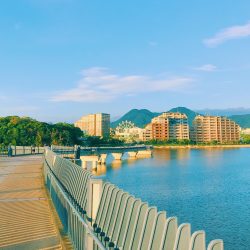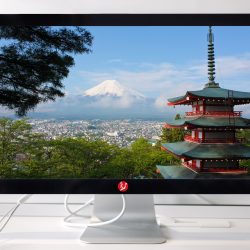Do you wonder, what will you learn in a Japanese language school in Fukuoka? The obvious answer is… well Japanese of course! But is the learning experience the same in all Japanese language schools in Japan? We believe the answer to this question is: No. But maybe not for the reason you think!
What impacts my Japanese learning experience?

A lot of factors will make your Japanese learning experience different. But since GenkiJACS has taught Japanese to foreigners for more than 15 years, our experience tells us that one crucial factor is: what happens outside of school.
The method we use to teach Japanese is the same in all our schools. We focus on Japanese communication, and want you to be able to speak as much Japanese as possible. Thanks to that, the experience you will have in our small classes of maximum 8 students is identical in all our schools. However, the city where you live will have a bigger impact than you think!
Once you are outside of the classroom is the real challenge. You need to use all the Japanese you have learnt in class. We are not saying that there are no challenges during class. But once you are out there, you are on your own. Because of this, cities more famous among travelers, tend to have more people who speak English. This means that it will often happen that you approach someone for information, speak in Japanese, only to have them answer in English. While sometimes very helpful, it can be frustrating when your goal is to use the Japanese you have learnt!
Arrives Fukuoka! Fukuoka is a smaller city, not so famous, and because of that, fewer people speak English here. This is a great setup if your goal is to be exposed as much as possible to the Japanese language and learn faster.
How do I learn Japanese with the Japanese language school GenkiJACS?

If you have made up your mind and want to study in a Japanese language school in Fukuoka, first of all: great choice! GenkiJACS has a school in Fukuoka, so we would be very happy to have you as a student.
We can teach students from different levels, and the only requirement is to know the Hiragana alphabet. This is one of 3 Japanese alphabets, and is usually pretty simple to learn. You can test yourself and learn this alphabet here: https://www.genkijacs.com/japanese-characters-quiz.php. There is also a very convenient interactive Hiragana chart here: http://www.hiraganaposter.com/ (it even has sound!)
Once you have mastered the alphabet, you are ready to study with us! Learning Hiragana should be quick, and if you apply yourself, it should take 2 weeks to be able to read and less than 1 month to write.
What happens during class?

We cannot speak for other Japanese language schools in Fukuoka, but here is what GenkiJACS does. The most important thing to understand is that we have small classes (maximum 8 students), so you will have plenty of chances to speak Japanese during class.
You will have class from Monday to Friday, every day, 4 classes per day.
Our main approach for people who are new to learning Japanese, is to split classes in 2 categories. The first kind of classes you will have is what we call “input” classes. This is when you are taught something new and need to “input” this in your brain. How about we try together? Take the following example:

Wow, you have learnt your first Japanese sentence! You should be proud of yourself!
The second kind of classes you will have, is what we call “output” classes. During output classes, it is time to use what you have learnt in the input classes. This will be done through roleplay and pair work with your classmates. Every student will have the chance to practice, making sure nobody is left out. Ready to practice now? Let’s do it! Here is a list of words you can use instead of the ones used in the example sentence above.
To replace こんにちは:
- こんばんは (Good evening)
- おはよう (Good morning)
- はじめまして (Nice to meet you)
- よ!(Yo!)
To replace わたし:
- あなた (You)
- おかあさん (my mother)
- おとうさん (my father)
- おねえさん (my big sister)
- おにいさん (my big brother)
To replace たけし:
- You can write your own name in Hiragana
- せんせい (a teacher)
- さむい (cold)
- うれしい (happy)
Here is an example from us: こんばんは。おかあさんはせんせいです。(Good evening. My mother is a teacher.)
The list is not exhaustive, and you can use your own vocabulary too! Let us know in the comment what sentences you come up with. Bonus points for originality!
You will have input and output classes every day. And during output classes, you will not only use the new sentence structure you have just learnt, but also all that you have learnt previously.
Want to learn more with a Japanese language school in Fukuoka? Get in touch with us and we will help you decide when to study: https://www.genkijacs.com/contact.php. You already know when you want to come to Fukuoka? Say no more, here is the estimate request form: https://www.genkijacs.com/fukuoka-booking.php.
See you soon, in Japan!


